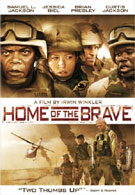No matter what your view may be on the current situation in Iraq, it is impossible to deny that Americans are returning home with severe injuries. Some soldiers are losing arms or legs, while others are losing sleep after witnessing atrocities friends and family members could never properly imagine. Their stories are an important part of this country's history, and they deserve to be honored properly for their service. Home of the Brave tells the story of a group of American soldiers from Spokane, Wash., who learn their tour of duty in Iraq is nearing its end. Before they return home, however, they are sent on one last humanitarian mission to escort trucks carrying medical supplies to an Iraqi village. It is in this Iraqi village that a bloody ambush occurs and changes the soldiers’ lives drastically.
Upon arriving home, Tommy Yates (Brian Presley) struggles with the memories of his best friend, Jordan (Chad Michael Murray), being shot in front of him, while Jamal Aiken (Curtis Jackson, a.k.a. 50 Cent) deals with the fact he shot an innocent Iraqi woman. Vanessa Price (Jessica Biel), a 24-year-old single mother, tries to do everything on her own while coping with a new prosthetic right hand. Dr. Will Marsh (Samuel L. Jackson), a combat doctor, returns from the battlefields to drown his sorrows in alcohol while lashing out at his wife, Penelope (Victoria Rowell), and son, Billy (Sam Jones III).
While the story has a tendency to drag from time to time, and even be a little too in-your-face with its “We love the troops” motif, the performances are the true heart of the film. Samuel L. Jackson, in particular, gives a solid turn as a man who quickly finds his alcoholism affecting his daily decisions, both at work and home. Marsh stands out because he is the one character that seems to go through the most changes in the film. After becoming a war hero, saving the lives of countless soldiers including Price, Marsh feels he fails in his duties overseas, which leads to him drinking. Marsh’s behavior strains an already deteriorating relationship with his son and places his marriage in danger, especially when he refuses to seek help for his problems.
Biel also gives a solid performance as a woman struggling to maintain her identity as an athletic, strong woman after she loses her right hand during the ambush. The thing that stands out about her performance is the fact that she did not play a woman who gets by on her looks. She plays a plain-Jane who wants to have a normal life and take care of her son. The one actor I didn’t feel anything toward, however, was 50 Cent. Jamal is one of the film's main characters, and has one of the more intriguing story lines, but you rarely see him on screen after he shoots an innocent Iraqi. When he is on screen, the film focuses on his rage when he can’t get the help he needs or his girlfriend refuses to see him. We only briefly hear about the innocent woman he shot while he’s in a group therapy session. It seems as if his story line got lost in the mix.
While Home of the Brave is a great tribute to the soldiers fighting for our country, there is a little too much going on. It's a great idea to tell a story of one group of Army guards from one area of the country, but there is a lack of balance in whose story is being told or how redundant certain portions of those stories become. We know that war is hell and coming home from war isn’t any better, but the message is put into overdrive in this film – it literally feels like you’re being ambushed by the director. There are powerful scenes, but, for the most part, the movie seems melodramatic to the point where it feels more like a Hallmark movie of the week.
Director Irwin Winkler uses a formulaic, straight-from-the-heart approach to tell a story he co-wrote with Mark Friedman. Had his been about any other war during any other time, it would have been another run-of-the-mill Hollywood flop. Home of the Brave is not intended to shock you or change your views on the Iraq war or the government. Heck, it barely touches on all of the political angles of the war, which is refreshing since the last thing we need is another movie slapping us across the face with another view of the Iraq war. Home of the Brave, however, is rather unsubtle in its attempts to garner sympathy for the soldiers returning home with mental and psychological wounds. It is simply a well-acted film that takes advantage of the timeliness of its subject matter. One thing I am happy to see on the disc for Home of the Brave is the lack of special features. It’s not because the movie was bad or because I don’t want to watch a lot of them, but it’s a subject matter that is in everybody’s face each and every day. It is a good thing that Winkler and crew did not take the opportunity to create features that would glorify aspects of the war or give performers a forum to express their views on the war. Keeping it simple, much like the movie, is definitely the best way to prevent getting shot in the foot. However, it is a shame the disc didn’t make better use of its Oscar-nominated song by Sheryl Crow, “Listen to the Brave.”
The first of the two features on the disc is a commentary that features Winkler, Friedman and producer Rob Cowan talking about the film. The great thing about their commentary is the fact that they do talk about the film and their feelings toward certain characters and scenes. The three men never use the commentary as their forum to express their political views. In fact, they talk about 12 pages worth of notes given to them by United States Department of Defense. They said some of the notes help the film with its accuracy, but others were things that they could not take as truths. They also point out that the government objected to a scene where Chad Michael Murray uses a soldering iron to put armor onto one of the humvees, but the filmmakers say it is an important part of that scene, which they believe to be true.
The commentary portion of this disc is truly an experience, probably more so than the film itself. The filmmakers wanted to educate and enlighten, not stuff people with information that is already known or views that don’t need to be aired. During this feature, they talk about the research done to make the film accurate and successful. While the movie is good enough on its own, you will respect the filmmakers even more if you watch the movie with the commentary. Listening to their passion for Home of the Brave will make you understand that this movie was not made because of political views, but because these people care deeply about the soldiers coming home with scars that may last a lifetime.
The other feature is five minutes worth of deleted scenes which you can watch with or without the filmmakers’ commentary. The first scene is called, “Soldiers Get News They Are Returning Home,” which is an extension of the opening sequence of the movie featuring Presley, Murray and 50 Cent (as Winkler refers to him) playing video games and joking around. The scene lasts a little more than a minute. The other scene is called “Vanessa and Cary Get to Know Each Other.” This scene features Biel and Jeffrey Nordling, who plays a teacher named Cary working in the same school as Vanessa. This is another extension of a scene where Vanessa finally opens her life to the possibility of a relationship. This feature could be a lot better if more scenes were added, considering most films with deleted scenes as a bonus material show five or six sequences.
It is a great thing that there are no features about the actors going to Iraq or a Walter Reed Hospital to visit soldiers. It is even better that there are no interviews in a typical making of feature, because the last thing we need to hear is Jessica Biel giving her opinion on the Bush administration. For a movie to tackle such a delicate subject matter, I am glad the filmmakers choose to keep the features to minimum. If only the United States could reduce the number of soldiers coming home injured, or dead, from this war.
Chappell Roan Just Wore A Mini Dress With A Ruffle Hiding Her Face, And It's Giving Me Serious 1500s Vibes
After News That Taylor Swift Might Be Subpoenaed In It Ends With Us Case, An Insider Made Claims About Where Her Friendship With Blake Lively Stands
‘I Do’: Kristen Stewart And Dylan Meyer Confirm Their Marriage With The Most Heartwarming Images











